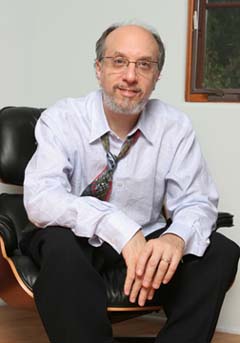 |
 |
| current issue |  |
past issues |  |
send a letter/news |  |
address update |  |
advertise |  |
about us |  |
alumni home |
Alumni Profiles
Sound TrackedSteve Bramson '78 writes music to match the drama onscreen
By C.W. Wolff

|
"Give me a minute," has a special meaning to people who score music for television or films. It doesn't sound like much, but it might be just the break a composer is hoping for. Steve Bramson '78 got just such a break in the late '80s when he was asked to write a minute of music for Steven Spielberg's TV series "Tiny Toons Adventures." He soon was writing regularly for the show, winning an Emmy in 1993. He went on to score more than 200 episodes of the TV series "JAG," earning another two Emmy nominations.
His movie credits include music or orchestration for "Apollo 13," "In Enemy Hands," "James and the Giant Peach," "Starship Troopers," "Lost in Space," "Jake and the Fatman," "The Young Indiana Jones Chronicles," "Love Can Be Murder," "The Crude Oasis," "The Boxer" and "Scooby-Doo on Zombie Island. " Then there was the gig writing music for the world's fastest indoor roller coaster at Disneyland Paris. Bramson, who hates roller coasters, had to endure the two-minute ride more than 20 times, clutching a stopwatch at first to clock the length of each segment and later fine-tuning what he wrote. Of course, the job meant two expense-paid trips to Paris.
Bramson was born into a musical family. His mother sang opera; his father, a clarinetist, ran a music school. But Bramson didn't think music was a viable career path and majored in economics at UNH. Late in his senior year, however, music professor Dave Seiler invited jazz clarinetist Buddy DeFranco to UNH. The jazz band played Bramson's arrangement of Cole Porter's "You'd Be So Nice to Come Home To." DeFranco liked it and paid Bramson for the right to use it.
"That was a kick in the pants for me," recalls Bramson. "I thought, maybe I can make a living at this." Five years of intense music studies followed, including a master's degree from Eastman School of Music. By 1984, he was in Los Angeles, working as an apprentice with composer Laurence Rosenthal. Then he got his initial minute, and steady work followed.
Scoring any TV series is "like doing a sprint and then running back to the start and doing it again," says Bramson. "It's exhausting." A productive day's work for a composer is 2.5 good minutes of music. Each "JAG" episode--22 a season--demanded about 20 minutes of new music. That would often mean 10- to 14-hour days when he was on deadline. He would conduct a 35-piece orchestra in recording the score and receive the next episode the same day. He'd also attend a meeting with producers to discuss which parts of the show needed music. Then he'd go home and write. It would take him up to six days to finish and record the score. That pace might go on for 10 or 12 weeks without a break. Twenty-two episodes were produced in nine months. "The good news is that I worked from home and had summers off," he says.
After "JAG" ended, Bramson wrote for other shows, including a short-lived ABC show, "The Nine," and has been able to spend more time with his wife, Ruth, a composer and singer, and their 3-year-old, Joshua. His son, notes Bramson, is a big fan of marimba music, but, luckily, is still too young to want to ride roller coasters.
Easy to print version blog comments powered by Disqus
